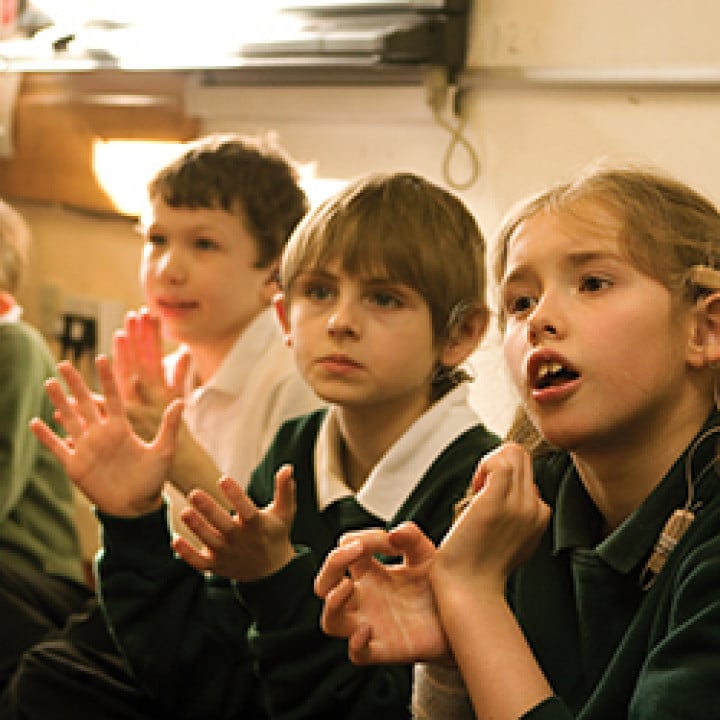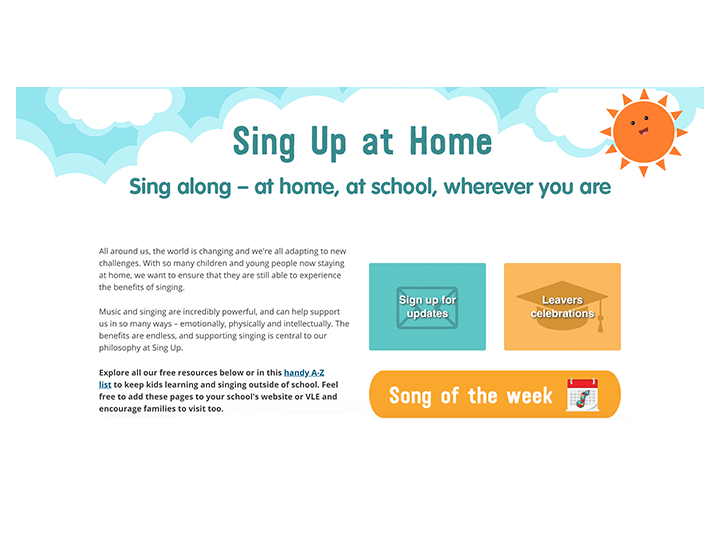
As well as organising singing in assembly and choir, providing other non-formal and formal singing opportunities might just be the thing to inspire your school community to join in with, and really enjoy, singing. Here are some ideas from the Sing Up community and our team.
1. Before the school day
Help pupils get motivated and wake up bodies and voices with a pre-school singalong. This could be an informal sing at breakfast club, or you could use this time slot to rehearse with your singing group if the lunch time slot is already taken. Alternatively, welcome in parents and guardians for an early morning sing followed by a cup of tea. We’ve heard it can do wonders to improve attendance.
2. Topic-based singing projects
Delve into the huge range of song topics available in the Song Bank creating your own playlist of repertoire, then learn it as part of a project. It will enhance the topic and help develop pupils’ knowledge. Here’s a lovely example that teacher Sam Hughes gave us over on Facebook.
'Lunchtime choir happens across both sites of my school, singing assemblies and an animal singing project involving 150 children. Those 150 children are singing songs about animals they were learning about in their class topic. The songs were in unison, rounds, call and response – and simple harmonies as the children were only in year 1. We used I once saw an elephant from Sing Up as part of the project, and we performed in the playground to the children's families.'
We're sure those year 1 pupils will remember their animal topic for a long time.
3. Inter-house singing events
If your school is organised into ‘houses’ why not hold an inter-house competition? Each house should select their own song from the Song Bank then rehearse it for an end of term event. For added excitement invite a local VIP to be the judge and think of a suitable prize for the winning house. Music teacher Steven Griffin told us on Twitter how he takes his ‘House Choir’ events to the next level by putting the onus entirely on his students to rehearse themselves.
'House choirs happen everyday at break over a four week period with no help from staff before a school-wide competition.
'Other singing at this school includes large choirs open to all at lunch time; auditioned choirs before school starts (8.15am!); smaller ensembles for 8-16 members are available; friends can also get together to sing each other's compositions.'
We love that Steven gives students the space to try out each other’s compositions and that they have so much agency in their own rehearsals.
4. Weave singing into annual school traditions
If you hold annual events such as a Christmas concert, World Book Day, summer fair or sports day and don’t already include some singing then consider how you could weave singing into it. It doesn’t just have to be the choir who sing; maybe each year group could learn a ‘book themed’ song or the staff could sing at the summer fair. Maybe you could invent your own new tradition like St Theresa’s in South London who have developed an annual event of making a staff Christmas video. Another great event to get the whole school singing is a Christmas carol service. Director of Music, James Manwaring (see more ideas from James on getting pupils singing in class on page 18) uses the annual carol service at his secondary school in lots of ways. ‘All students attend our annual Carol Service and give it their all. What makes this service such a success is our two rehearsals where I lead them in singing the carols and encourage them to stand correctly, breath correctly and sing with all their might. It’s a breathtaking sound hearing all of the students singing with gusto and passion.’
5. Flash mobs
As if singing didn’t already release enough positive hormones into your bloodstream, try boosting your singing with the adrenaline rush that comes from giving a surprise performance. Flash mobs are lots of fun at any age. Maybe you’d like to mark a special occasion (like Red Nose Day, Sing Up Day or sports day), surprise parents at home time, or raise money for a good cause. This is also a great way to engage your wider community by taking your surprise singing into the town centre.
6. Smaller ensembles and a cappella groups
Massed singing isn’t the only solution. It’s important to offer opportunities to smaller groups of singers with more specific interests. For example, you might have a group interested in music in a particular style or a smaller group of boys going through vocal change that you’d like to offer separate opportunities to. For experienced singers, try introducing a chamber or a cappella group where they can focus on part singing and blending their voices. These groups could be run with light supervision and be given more freedom in their rehearsals.
What are your ideas for collective singing at school? Let us know in the comments below or via Twitter and Facebook.



